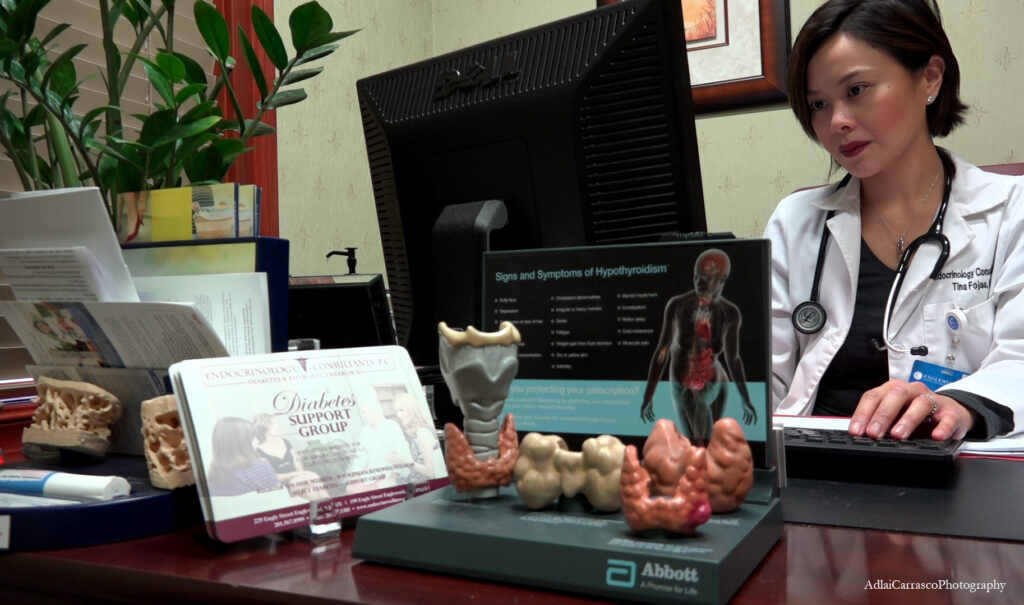Hypothyroidism
What Is Hypothyroidism?
Hypothyroidism is a condition in which the thyroid gland does not produce enough thyroid hormone. It is the most common thyroid disorder.

Navigating Hypothyroidism: When the Thyroid Slows Down
Hypothyroidism is a prevalent medical condition characterized by insufficient production of thyroid hormones by the thyroid gland, which can lead to a range of health issues. The thyroid hormone plays a vital role in regulating metabolism, energy production, and overall bodily functions.
What Are The Causes Of Hypothyroidism?
In approximately 95 percent of cases, hypothyroidism is due to a problem in the thyroid gland itself and is called primary hypothyroidism. However, certain medications and diseases can also decrease thyroid function. As an example, hypothyroidism can also develop after medical treatments for hyperthyroidism, such as thyroidectomy (surgical removal of the thyroid) or radioactive iodine treatment (to destroy thyroid tissue). In some cases, hypothyroidism is a result of decreased production of thyroid-stimulating hormone (TSH) by the pituitary gland (called secondary hypothyroidism).
Medications and Diseases: Certain medications and health conditions can interfere with thyroid function and trigger hypothyroidism. For instance, medical treatments like thyroidectomy or radioactive iodine treatment for hyperthyroidism can inadvertently lead to an underactive thyroid.
Secondary Hypothyroidism: In some cases, the pituitary gland might not produce sufficient thyroid-stimulating hormone (TSH), leading to reduced thyroid hormone production. This scenario is known as secondary hypothyroidism.
What Are The Signs And Symptoms Of An Underactive Thyroid?
Hypothyroidism can manifest through a spectrum of symptoms, although some individuals might not experience any noticeable signs. Common symptoms include:
Fatigue: Overwhelming tiredness and lack of energy.
Slight Weight Gain: Gradual increase in weight despite no significant change in diet or activity.
Cold Sensitivity: Feeling excessively cold even in mild temperatures.
Hair and Nail Changes: Coarse or thinning hair, as well as brittle nails.
Constipation: Difficulty passing stools regularly.
Dry Skin: Skin becomes dry, flaky, and may be accompanied by itching.
Hoarseness: Changes in the voice, often sounding more raspy or husky.
Muscle Aches: Experiencing muscle aches and pains, sometimes mistaken for generalized fatigue.
Joint Discomfort: Stiffness and discomfort in joints, resembling the symptoms of arthritis.
Depression: Mood changes, including feelings of sadness and depression.
Memory Issues: Difficulty concentrating, forgetfulness, and mental fog.
Irregular Menstrual Cycles: Women may experience irregular periods or heavier menstrual flow.
Thinning Eyebrows: Outer portions of eyebrows may thin out or disappear.
Puffy Face: Face and eyes may appear swollen or puffy.
Elevated Cholesterol: Increased levels of cholesterol, raising the risk of heart-related complications.
Decreased Libido: Reduced interest in sexual activity.
How Is Hypothyroidism Diagnosed?
Thyroid Function Tests: Measures levels of thyroid hormones (TSH, FT4, FT3) in the blood.
Thyroid Antibodies: Checks for thyroid-related antibodies like Thyroglobulin Ab and Thyroid Peroxidase Ab.
Thyroid Ultrasound: Visualizes the thyroid gland to identify any structural abnormalities.
What Are The Possible Treatments For An Underactive Thyroid?
Treating hypothyroidism typically involves daily intake of thyroid hormone pills. Over a period of 4-8 weeks, these pills aim to restore thyroid hormone levels to a normal range. Regular blood tests help monitor progress, and dosage adjustments might be made accordingly. Many individuals with hypothyroidism require lifelong medication management.
Are There Preventative Steps Or Measures To Avoid Hypothyroidism?
Preventing hypothyroidism is challenging as it is often rooted in genetics or underlying conditions. Left untreated, hypothyroidism can lead to serious health complications:
Untreated hypothyroidism can weaken and slow the heart, causing breathlessness and fatigue, especially during physical activity. Elevated blood pressure and cholesterol levels can increase the risk of cardiovascular and cerebrovascular diseases. Furthermore, when hypothyroidism remains inadequately treated, it can induce profound fatigue and a persistent lack of energy, exerting a detrimental impact on all facets of an individual’s life.
What Are The Risk Factors of Hypothyroidism?
Gender and Age: Thyroid issues are more prevalent in women and tend to increase with age.
Genetics: A family history of thyroid disorders can elevate the risk.
Autoimmune Disorders: Individuals with autoimmune disorders, such as Hashimoto’s thyroiditis, have a higher susceptibility.
Are There Other Related Conditions To Hypothyroidism?
For those with Hashimoto’s thyroiditis, an autoimmune disorder leading to hypothyroidism, the risk of developing other autoimmune conditions may be elevated.
Conclusion: Seeking Proper Care
Hypothyroidism is a manageable condition, but its diverse symptoms and potential risks underscore the importance of proper diagnosis and treatment. Given the overlap of symptoms with other medical conditions, seeking an evaluation by an Endocrinologist is crucial for accurate diagnosis and tailored management. By addressing hypothyroidism effectively, individuals can improve their quality of life and mitigate associated health risks.
Key Takeaways About An Underactive Thyroid
- Hypothyroidism is a treatable condition that makes you feel tired.
- Other symptoms of hypothyroidism include: Lack of energy, getting cold easily, developing coarse or thin hair, or constipation. If it is not treated, hypothyroidism can also weaken and slow your heart, elevated your blood pressure or elevated cholesterol.
- Some people with hypothyroidism have no symptoms. It can be hard to diagnose because a lot of conditions can cause similar symptoms. Therefore, getting evaluated and treated accordingly by an Endocrinologist is important.

